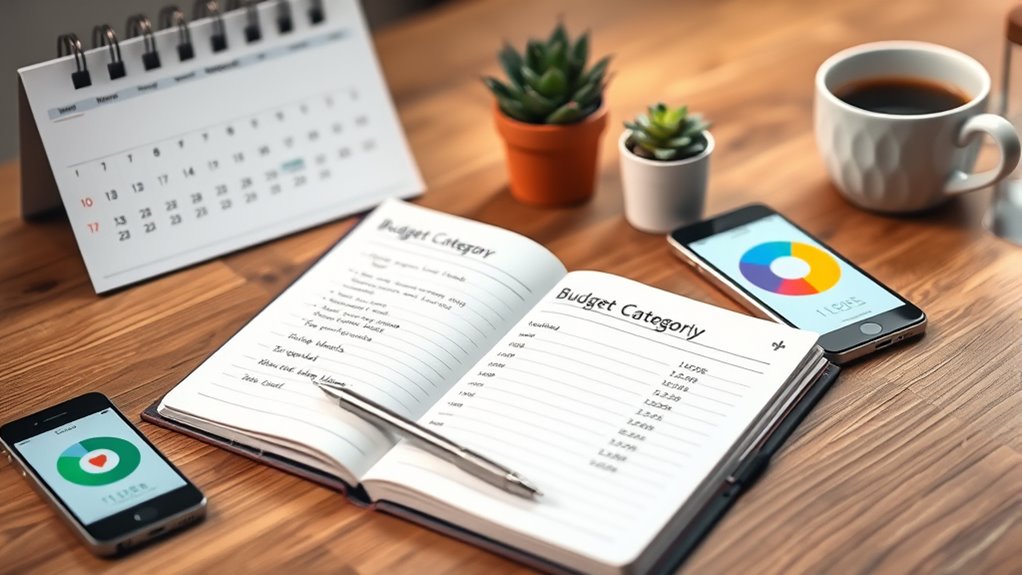To keep it simple, start by knowing what you earn each month and tracking all your expenses, like groceries, bills, and entertainment. Set clear spending limits based on your income and prioritize saving first, before spending on anything else. Use straightforward tools like spreadsheets or apps to stay organized, and review your budget regularly to make adjustments. Want more easy tips? Keep going to learn how to make budgeting even simpler and more effective.
Key Takeaways
- Track all income and categorize expenses to understand your spending habits clearly.
- Set realistic spending limits for each category based on your income and goals.
- Regularly review bank statements and cancel unwanted subscriptions to stay on top of finances.
- Use simple tools like spreadsheets, digital wallets, or envelope systems for easy budgeting.
- Prioritize savings by automating deposits and periodically adjusting your budget to stay aligned with financial goals.
Know What You Earn and Spend

Do you really know exactly how much money comes in and goes out each month? The first step is income tracking—keeping a record of every dollar you earn. This helps you see your total income clearly. Next, focus on expense categorization; break down your spending into groups like groceries, rent, entertainment, and bills. This makes it easier to identify where your money is going. Use a simple spreadsheet or budgeting app to log your income and expenses regularly. Tracking your finances gives you a snapshot of your financial health, so you can make smarter decisions. Without knowing what you earn and spend, it’s impossible to create a realistic budget. Staying organized through consistent tracking can help you notice patterns and manage your money better. Soon, you’ll have a clear picture of your financial flow.
Set Clear Spending Limits

Have you set specific spending limits for different categories of your budget? Doing this helps you manage your cash flow effectively and avoid overspending. Break your expenses into categories like groceries, entertainment, transportation, and savings. Assign a clear limit to each, making sure they align with your income and financial goals. Setting these limits keeps your spending in check and prevents surprises at the end of the month. It’s easier to stay disciplined when you know exactly how much you can spend in each area. Remember, these limits should be realistic and adaptable as your financial situation changes. By establishing clear spending boundaries, you gain better control over your money and make smarter decisions that support your long-term financial health. Additionally, understanding your spending limits for gravel bike tires can help you optimize your riding experience without overspending on unnecessary gear.
Track Your Expenses Regularly

To stay on top of your budget, you need to track your expenses regularly. Use a spending log, review your monthly statements, and set reminders to keep yourself accountable. These simple steps make it easier to see where your money goes and adjust your habits accordingly. Incorporating cost‑of‑ownership math can also help you understand the long-term expenses associated with your spending choices.
Use a Spending Log
Keeping track of your expenses with a spending log helps you stay aware of where your money goes each month. By consistently recording your spending, you can identify patterns and see how much you’re tracking cash or using cards. Categorizing expenses—like food, transportation, and entertainment—makes it easier to spot areas where you might cut back. Use a notebook, app, or spreadsheet to log every purchase, no matter how small. This habit keeps your financial goals clear and prevents overspending. Regularly updating your spending log guarantees you stay on top of your budget, giving you a real-time picture of your finances. Incorporating expense tracking tools can further streamline the process and provide additional insights. Over time, you’ll notice trends and be better equipped to make smarter money decisions.
Review Monthly Statements
How often do you review your monthly statements? Regularly checking your bank and credit card statements helps you spot suspicious charges early. Look for any unfamiliar transactions or errors that could indicate fraud. Pay special attention to recurring fees—subscriptions or automatic payments you no longer need or recognize. Cancel any unwanted subscriptions to avoid unnecessary expenses. Reviewing statements also helps you stay aware of your spending habits, ensuring you stick to your budget. Setting a specific day each month for this task creates a consistent review routine, making it easier to stay on top of your finances. This habit enables you to catch mistakes promptly and prevent overspending. Staying vigilant with your monthly statements keeps your finances transparent and gives you control over your money.
Set Expense Reminders
Have you set up reminders to track your expenses regularly? Staying on top of your spending helps you stick to your budget. Use alerts or calendar notifications to remind yourself to review your expenses weekly. Automate payments for bills to avoid late fees and guarantee your expenses are up-to-date. When tracking, categorize expenses into groups like groceries, entertainment, or transportation. This simplifies identifying spending patterns and adjusting your habits. Setting reminders keeps you accountable and prevents small costs from slipping through the cracks. Regularly assessing your spending habits can maximize space and organization in your financial planning, making budgeting more manageable and effective. By consistently monitoring your expenses, you’ll gain better control over your finances and stay aligned with your budget goals. Remember, regular tracking makes budgeting easier and more effective, helping you build a secure financial future.
Prioritize Saving Before Spending

Since building a solid financial foundation starts with discipline, it’s essential to prioritize saving before spending. Begin by setting aside a portion of your income for an emergency fund, which provides security during unexpected expenses. Once you’ve established this safety net, focus on debt reduction, paying off high-interest debts first to avoid extra costs. By saving consistently before spending on wants, you ensure your future financial stability. Making saving a priority helps you avoid living paycheck to paycheck and reduces financial stress. Remember, the goal isn’t just to spend less but to allocate funds wisely, ensuring your savings grow and your debts shrink. Recognizing the importance of financial development can motivate you to stay committed to your savings plan. Prioritizing saving now sets you up for a more secure and stress-free financial future.
Use Simple Tools to Stay on Budget

Using simple tools can make it easier to stay on budget and avoid overspending. Digital wallets help you track expenses effortlessly and keep your spending organized. By linking your accounts, you can see where your money goes in real-time, making adjustments easier. The envelope system is another effective tool; it involves dividing cash into labeled envelopes for different categories like groceries or entertainment. This method encourages discipline by limiting your spending to the cash allocated in each envelope. Both tools simplify budgeting and keep you accountable. You don’t need complicated spreadsheets or apps—just a few straightforward methods to stay aware of your finances. Using these simple tools helps you maintain control and stick to your budget more consistently. Additionally, understanding the importance of necessary cookies ensures that your budgeting tools function smoothly without compromising your privacy.
Review and Adjust Your Budget Periodically

Regularly reviewing and adjusting your budget guarantees it remains aligned with your current financial situation. Life brings unexpected expenses, like car repairs or medical bills, which can throw off your plans. Seasonal changes also impact your spending, such as higher utility bills in winter or increased entertainment costs during holidays. By checking your budget regularly, you can identify where adjustments are needed. If you notice overspending in certain areas or income changes, tweak your categories accordingly. This proactive approach helps you stay on track, avoid debt, and reach your financial goals. Remember, your budget isn’t set in stone; it’s a flexible tool that should evolve with your circumstances. Periodic reviews keep your finances realistic and manageable, giving you better control over your money. Additionally, incorporating monthly expense tracking can help you catch overspending early and make smarter adjustments.
Frequently Asked Questions
How Can I Stick to My Budget During Unexpected Expenses?
When unexpected expenses hit, tap into your emergency fund to avoid derailing your budget. Keep expense tracking handy so you can quickly see where you stand and adjust if needed. Prioritize essential costs and cut back on non-essentials temporarily. By regularly monitoring your expenses and maintaining a dedicated emergency fund, you stay on track and handle surprises without sacrificing your financial goals.
What Should I Do if I Overspend One Month?
If you overspend one month, don’t panic. First, review your spending tracker to see where you went over budget. Use your emergency fund if necessary, but aim to replenish it quickly. Adjust your next month’s budget by cutting non-essential expenses. Staying disciplined helps you recover faster and keeps your finances on track. Remember, a little flexibility and good tracking can prevent future overspending.
How Can I Motivate Myself to Save Consistently?
Think of your savings as planting seeds for a better future. To stay motivated, set clear saving goals and break them into smaller milestones. Establish consistent saving habits by automating transfers and tracking your progress. Remind yourself of the benefits, like financial security and peace of mind. Celebrating small wins keeps your motivation high, turning savings into a rewarding journey instead of a chore.
Are There Any Common Mistakes to Avoid in Budgeting?
To avoid financial pitfalls and budgeting myths, you should track your expenses carefully and set realistic goals. Don’t underestimate your costs or overcompensate with strict rules that lead to frustration. Avoid common mistakes like neglecting to review your budget regularly or assuming your income stays the same. Stay flexible, educate yourself about budgeting myths, and adjust your plan as needed to stay on track and make your money work for you.
How Do I Balance Debt Repayment With Saving Goals?
You need to kill two birds with one stone by balancing debt repayment and savings goals. Start by building an emergency fund to cover unexpected costs, then allocate a fixed amount toward debt each month while setting aside a bit for savings. Prioritize your financial goals based on urgency and importance, ensuring you’re making steady progress without sacrificing your financial stability or delaying essential debt payments.
Conclusion
By following these simple tips, you’ll see your money work for you instead of slipping away unnoticed. Imagine your budget as a steady boat on calm waters, guiding you safely through each month. When you stay aware of your earnings and spending, you create a clear path forward. With just a little effort and regular adjustments, you’ll turn financial chaos into a peaceful journey, making your money serve your dreams instead of drowning in confusion.









